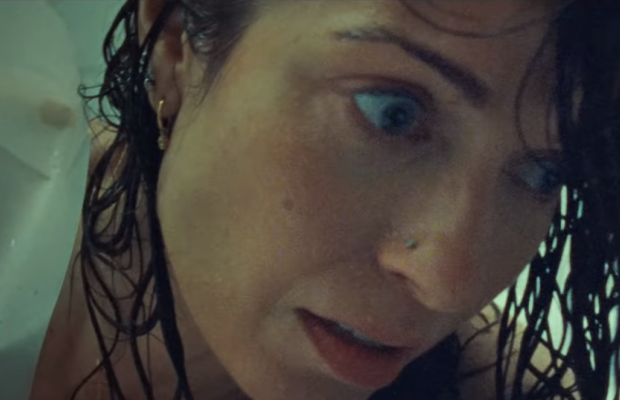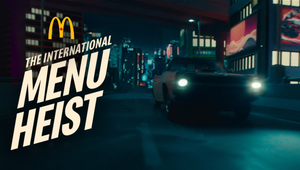
The Story Behind ‘My Sclerosis’, a Short Film About How MS Affects Day-to-Day Life

'My Sclerosis' is a short film that was written, directed and produced by Stash Capar. Stash was diagnosed with multiple sclerosis in 2011 and after an understandably rough time with the condition, his mindset changed in 2019. He felt that he was in a place where he could open up about his experiences and potentially connect to others living with MS. So, Stash made a film (he's a director repped by Circle Productions in Canada). It was his attempt to show how MS affects day-to-day life in a compelling way based on his own symptoms and experiences. It does exactly that. It's a beautifully shot piece of film with a relatable narrative that'll keep you watching until the end. It's also educational, especially when it comes to the common unseen symptoms of MS.
The process of making the film also led Stash to collaborate with Shift.ms, which is a charity founded by people with MS as a supportive. On top of being a supporting partner for the project and a platform for which to get more eyeballs on the film, Shift.ms also offered a connection for Stash that he hadn't experienced in nearly a decade of having MS.
LBB's Addison Capper spoke with Stash to find out more about 'My Sclerosis', and how having MS has impacted his work as a director. You can also check out the film below.
LBB> When did you first decide that you wanted to make a film about living with multiple sclerosis?
Stash> I was diagnosed with multiple sclerosis in 2011. I had a couple rough years early on, but slowly, through trial and error, found ways to manage the disease. Most of my friends and acquaintances had no clue because the symptoms can be largely invisible from the outside and very rarely did I ever talk about it. I always found pride in being able to handle challenging things on my own and with MS it was no exception. Anytime someone asked me if I was ok, I would say ‘I’m fine’ and just deal with what was happening on my own, in silence. Which is exactly what Natalie (the main character in the film) does.
In 2019, my mindset shifted. I felt I was in a place in my life where I could open up about my experiences and maybe even reach out to people who are struggling with the illness. So, I made ‘My Sclerosis’. It was my attempt to capture the impact MS has on relationships and everyday routine, and to show how ‘I’m fine’ isn’t always the best path forward.
Eventually I realised that I would need to find a platform that I could partner with in order to get the film seen by a relevant audience. Shift.ms turned out to be perfect since it’s a charity founded by MSers, for MSers. I connected with the founder, George Pepper, whose diagnosis and experience mirrors my own in a lot of ways. It was amazing to chat with someone like him, a young person and a professional, going through what I was going through. It was the first time I had experienced a connection like that after nearly a decade of managing MS. We, as in ShiftMS and I, have plans to collaborate again soon.
LBB> What are your main aims and ambitions for this project? What do you hope people will take away from it?
Stash> My main aim was to open up about what I was going through and connect with others suffering in the same way. For those managing MS, I hope they can watch My Sclerosis and feel like they’re not alone. For the vast majority of people who don’t have it, I hope they can watch the film and gain a more personal and less abstract understanding of what MS does.
LBB> Where did you draw inspiration from for the narrative within the film?
Stash> I live next to a cafe which, for whatever reason, is very popular among 30-something-year-olds on Bumble dates. I go in there at least a couple of times a week to answer emails or write treatments. Every now and again I’ll peek over at a date in progress.
When I was writing the script for My Sclerosis I went into it knowing that we wouldn’t have a lot of resources, so the story would have to play out in a simple, common, every day situation. The coffee date felt right.
LBB> How did you decide how you wanted the film to play out? As in, why did you decide to make it a narrative short film instead of something more factual?
Stash> Going in, my mindset wasn’t ‘how do I tell my story?’ but rather ‘how can I use my personal experience to tell a compelling story about MS?’.
I’ve often been told that my work (almost all fictional narrative) feels very ‘real’. The reason for it is because virtually every film I’ve ever made has drawn on a real personal experience in some way. I like to treat life experience as a commodity.
LBB> The sound design is a really important element of the film as it's really the central message as to when the effects of multiple sclerosis are coming into play. How important was that for you? And what was the process like of turning a particular experience like that into something relatable and tangible for the audience?
Stash> MS is regarded as a ‘snowflake’ disease in that no two patients have the exact same symptoms. The approach that most films have taken in the past is to show the most obvious, ‘lowest common denominator’ symptoms - namely someone falling over or struggling to get up. While this can be effective and I included it in my film, I also wanted to capture some of the stranger symptoms and show the emotional impact they can have.
I knew sound design specifically would play a huge part. I brought Zenthing into the project for that exact reason. They’re a boutique sound design company that specialises in abstract ideas. I tried to describe the auditory symptoms as best as I could in the script, and then Jochen Mader (sound designer/composer) and I had a number of conversations. I was pleasantly surprised with how quickly he ‘got it’.
LBB> How did you find the experience of creating something so deeply personal?
Stash> I’ll be honest, at times during pre-production I started to hate the whole thing. I hated having to wake up in the morning and spend the entire day thinking about this disease that’s eventually going to kill me. But now, with a bit of distance, I’m really happy that I did it. I think the challenge forced me to grow as a filmmaker. This was a subject that was very close to home and painful to tackle, but within that fear and pain there was a lot of learning and growth. It was also my first time shooting on film, which was an experience within itself.
LBB> How does the disease impact your work as a director?
Stash> With MS, you spend a lot of time inside your own head, struggling with symptoms that are invisible to others. The disease made me acutely aware that what we see on the outside isn’t always a good reflection of what’s going on inside. I became generally fascinated by this idea of an internal life and it informs a lot of my process as a filmmaker. I always like to ask myself, ‘how is the character experiencing this?’
On a more philosophical level, multiple sclerosis made me very aware of the fact that my time on this Earth is limited. So, if I’m going to be a director, I better be a good one. I better create work that matters, that I can be proud of, and I better start now.
LBB> And then, more generally, how does multiple sclerosis impact your everyday life?
Stash> On good days, I’m generally fine (and I’m not just saying that). When I’m in a flow state, doing something I love, I forget I have MS. But then there are days where I feel like my consciousness is trapped in a body that is out of synch with my brain’s commands. There’s a separation between my thoughts and my movements. Years ago, when I was still adjusting to having MS, I would get angry and resentful, because I would remember a time when life was easier. Nowadays, I accept what’s happening, take a minute, and then find something that I love to do and focus on that. And everything becomes right again.
Since being diagnosed with MS I’ve created my best work to date, made great friends, picked up new skills, found an amazing partner, fought a man in a cage and won, and became closer than ever before with my family. MS is not the end. It can be a new beginning because it forces you to realise what really matters in life. You learn to appreciate the little things. You stop wasting time and energy on that which you can’t control.
LBB> Any parting thoughts?
Stash> To anyone suffering from this thing - don’t be scared of it. It is what it is. When I learnt to accept the unlucky hand I was dealt, I could start focusing on playing that hand to the best of my abilities.
It’s hard to imagine that your best days are ahead of you when you’re in pain, confusion and discomfort. But believe me, they are.
Finally, if you feel like you need to talk to someone who is going through what you’re going through, connect with Shift.ms. It’s a wonderful organisation.















